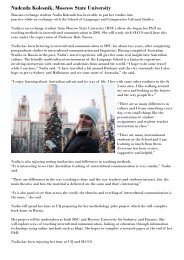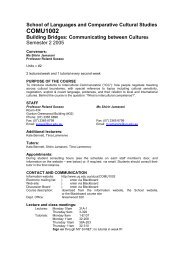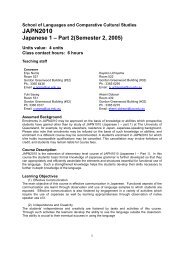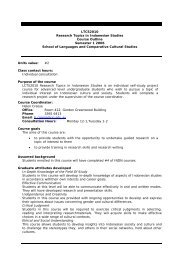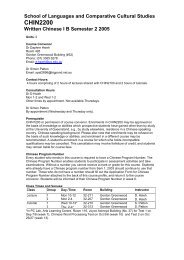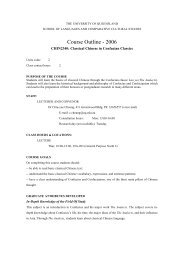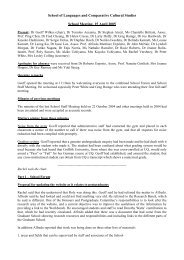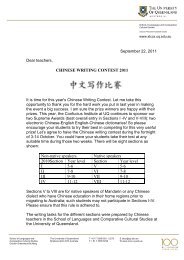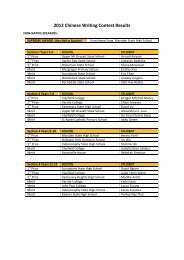Course Outline - School of Languages & Comparative Cultural ...
Course Outline - School of Languages & Comparative Cultural ...
Course Outline - School of Languages & Comparative Cultural ...
You also want an ePaper? Increase the reach of your titles
YUMPU automatically turns print PDFs into web optimized ePapers that Google loves.
SLAT7835 Language Testing and Assessment 14<br />
NOTE: Students who have a 7 or below in IELTS should seek assistance from Student<br />
Support Services or seek a private tutor to help them with their academic English skills.<br />
Information From: Student Support Services <br />
Subject: Services from Learning Advisers<br />
The largest part <strong>of</strong> our work involves helping students improve their assignment and<br />
thesis writing. This involves everything from understanding academic expectations (e.g.<br />
analysis and critique versus description; referencing conventions; etc.), conceptualising the<br />
topic/thesis, analysing the topic, organising one's thoughts, to working on drafts. It is<br />
important to note here that while we don't provide a grammar checking or pro<strong>of</strong>reading<br />
service per se, we DO work extensively with students to help them improve the clarity <strong>of</strong><br />
what they are saying. This sometimes involves working on grammatical correctness, but also<br />
involves helping students to work on removing ambiguity, reducing vagueness, and<br />
improving logical coherence and flow. Also, please note that we work on all the above things<br />
with students from ALL backgrounds, not just NESB students.<br />
Apart from helping students improve the quality <strong>of</strong> their assignments or theses, and to<br />
understand better what is required by different types <strong>of</strong> academic writing, we also work with<br />
students on developing appropriate and effective approaches to:<br />
• adjusting to university study (as a recent high school leaver, as a mature age student, as<br />
an international student);<br />
• increasing motivation and concentration;<br />
• study and time management;<br />
• reading, researching and note-taking;<br />
• improving oral presentations;<br />
• working and learning in small groups;<br />
• surviving quantitative courses (such as statistics) for the mathematically rusty or<br />
disinclined;<br />
• establishing and maintaining good working relationships with supervisors.<br />
We work with students both individually and in groups, as well as run both a workshop<br />
program open to all students (see: http://www.sss.uq.edu.au/index.htmlid=1185 ) and<br />
dedicated workshops at the request <strong>of</strong> individual academics. At each campus, students can<br />
make free and confidential individual appointments with a Learning Adviser as follows:<br />
ST LUCIA , The Relaxation Block (Building #21D in the Union Complex, opposite the main<br />
refectory), Phone: 3365 1704<br />
For self-help, students can also be directed to our websites:<br />
Studying at University as an International Student<br />
http://www.sss.uq.edu.au/linkto/isweb/<br />
UniStudy: first semester to graduation & beyond<br />
http://www.sss.uq.edu.au/linkto/ugweb<br />
PhD: First thoughts to finished writing<br />
http://www.ems.uq.edu.au/phdweb/phhome.html



![[first_name] [last_name] - School of Languages & Comparative ...](https://img.yumpu.com/50270271/1/184x260/first-name-last-name-school-of-languages-comparative-.jpg?quality=85)
